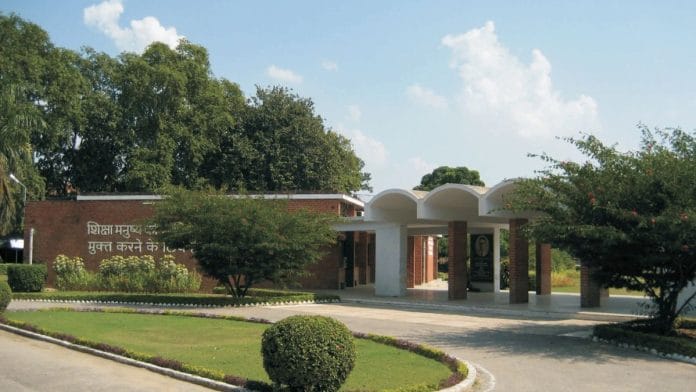New Delhi: Pointing out that the quality of investigation and the complaint failed to inspire confidence, the Supreme Court Friday set aside a criminal case of religious conversion against the vice chancellor, director, and three other officials of the Sam Higginbottom University of Agriculture, Technology and Sciences (SHUATS), which was earlier known as the Allahabad Agricultural Institute.
Quashing the criminal case, which was registered under the IPC and various provisions of the Uttar Pradesh Prohibition of Unlawful Religious Conversion Act, 2021, a bench of Justices J.B. Pardiwala and Manoj Misra said the FIR “suffers from an incurable legal defect, having been lodged by a person otherwise not competent in law to do so as per the then prevailing statutory scheme. In such circumstances, the only course that would meet the ends of justice is to quash the said FIR as well as all consequential legal proceedings”.
Saying that the anti-conversion law, which prevailed at the time the alleged offence of religious conversion took place, necessitated the presence of an “aggrieved” individual who was competent to lodge an FIR, under Section 4 of the 2021 Act, the court added that such an aggrieved person could only be family, or someone related by blood, adoption or marriage.
The court said that the complaint in the present case was filed against the university officials by those who were not competent to file it. Section 4 of the 2021 Act said that no stranger or third party can file a complaint of unlawful conversion. (However, the 2024 amendment to the UP law undid this legal position and now anyone can file a complaint of religious conversion.)
In the present case, the Supreme Court put to rest this dilemma and said that since the alleged offence took place when the unamended act was in force, the same would apply.
The court also clarified that the FIR for offences like attempt to murder, extortion and intentional insult with intent to provoke breach of peace under Sections 307, 386 and 504 IPC, still warranted further consideration and would continue, as one of the officials was charged with shooting one of the complainants in the arm and demanding money from them. But the case of unlawful conversion against the university officials was quashed. However, the parties were also given temporary protection from arrest.
Apart from the IPC provisions, the main charge against the university VC and other officials was that they lured people to convert with promises of jobs, cash or marriage.
In April, 2022, an FIR was registered in Fatehpur district of Uttar Pradesh, based on the complaint filed by Vishwa Hindu Parishad Vice President Himanshu Dixit, saying that the officials had indulged in cheating, criminal intimidation and forgery, along with unlawful religious conversion under Section 3 of the 2021 UP law.
The complaint spoke of an alleged event of ‘mass religious conversion’ at the Evangelical Church of India, Hariharganj, Fatehpur in April 2022, which happened to be ‘Maundy Thursday’, a day of religious significance for the followers of Christ. University VC Rajendra Bihari Lal, who was also known as Babaji, allegedly tried to convert people gathered outside the Church by using undue influence and coercion.
It was also alleged that patients from the Mission Hospital hospital were being converted.
Subsequently, an FIR was registered at the behest of the Vishwa Hindu Parishad against seven university officials who were charged with offences like culpable homicide not amounting to murder, abetment to suicide and intentional insult with intent to provoke breach of peace.
In 2023, the Supreme Court stayed the VC’s arrest after the Allahabad HC dismissed his plea for anticipatory bail. In 2024, the Supreme Court granted him anticipatory bail.
The VC’s lawyer had argued that he was being hounded, despite being the chair of one of the most prominent universities in Prayagraj. He also said that despite him not being named in the FIR, he was still being targeted.
Lal’s lawyer argued that he was cooperative during the investigation and had no concern or knowledge about the church or hospital where the alleged mass conversions took place. He also said attempts were being made to tarnish his image.
What the court ruled
Relying on the top court’s ruling in T.T. Antony v. State of Kerala (2001), the court said that an FIR lodged by a person who is not competent to lodge it under the unamended Section 4 of the U.P. Conversion Act, would amount to an “invalid FIR in the eyes of law”, and therefore the subsequent FIRs registered pertaining to the very same alleged incident would also not stand.
Criminal law cannot be allowed to be made a tool of harassment of innocent persons, allowing prosecuting agencies to initiate prosecution at their whims and fancies, on the basis of completely incredulous material, said the court, adding that allowing these proceedings to continue would hamper the cause of justice.
Pointing out the glaring infirmities in the FIR, the court said it was not open to the police to get persons with vested interests to make complaints about the incident after a considerable delay and initiate fresh investigation against them.
Saying that the FIR was lodged by a person not competent to do it as per the prevailing statutory scheme at the time, the court also added that the materials collected during the course of investigation lacked credibility and fell “hopelessly short of the standard necessary for permitting criminal prosecution to proceed”.
(Edited by Viny Mishra)
Also read: Can WhatsApp message alleging religious targeting amount to promoting enmity? Allahabad HC weighs in






